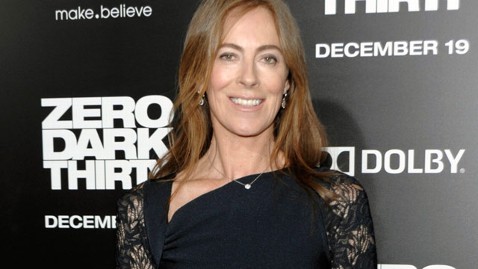'Zero Dark Thirty' Director: Torture 'Reprehensible'

(Dan Steinberg/Invision/AP)
The director of "Zero Dark Thirty," the Hollywood dramatization of the decade-long hunt for Osama bin Laden, said that she felt obligated to include grisly scenes of detainee torture at the hands of the CIA to tell the whole story of how America's most wanted man was finally killed.
"It's important to be faithful to the research," Kathryn Bigelow said Sunday after a screening of the film at New York's Museum of Modern Art. "Personally, I find it reprehensible, but I think to have omitted it would've been to whitewash history."
The movie, which has been lauded by critics since its limited release last month, features several disturbing scenes in which alleged al Qaeda members or associates are beaten, force fed or subjected to simulated drowning while under CIA supervision.
"It is part of that history, part of that story," Bigelow said. "It's not all of that story. There were many, many, many tactics that led to the finding of Osama bin Laden."
That observation echoed a previous statement by acting CIA Director Michael Morell, who said that enhanced interrogation played a role in the hunt for bin Laden but was not the "key" to finding the al Qaeda leader.
"…[T]he truth is that multiple streams of intelligence led CIA analysts to conclude that bin Laden was hiding in Abbottabad[, Pakistan]. Some came from detainees subjected to enhanced interrogation techniques, but there were many other sources as well," Morell said on the CIA website in December. "And, importantly, whether enhanced interrogation techniques were the only timely and effective way to obtain information from those detainees, as the film suggests, is a matter of debate that cannot and never will be definitively resolved."
Last week three high-powered senators, Intelligence Committee Chairman Dianne Feinstein (D.-Calif.), Armed Services Committee Chairman Carl Levin (D.-Mich.) and 2008 Presidential candidate John McCain (R.-Ariz.), revealed they had written two letters to Morell in December demanding to know what impact the CIA may have had on the depiction of enhanced interrogation in the film and whether the agency "misled" the filmmakers into thinking the tactic was effective.
"As you know, the film depicts CIA officers repeatedly torturing detainees. The film then credits CIA detainees subjected to coercive interrogation techniques as providing critical lead information on the courier that led to the [bin Laden] compound," one letter says. "The CIA cannot be held accountable for how the Agency and its activities are portrayed in film, but we are nonetheless concerned, given the CIA's cooperation with the filmmakers and the narrative's consistency with past public misstatements by former senior CIA officials, that the filmmakers could have been misled by information they were provided by the CIA."
READ: Senate Intel Committee Probes Bin Laden Movie Scenes
But Mark Bowden, author of "The Finish" which also chronicled the hunt for bin Laden, argued last week that the film is hardly pro-torture.
"Torture is presented as part of this story, something [the protagonist] accepts," he wrote in The Atlantic. "But it's also shown to be at best only marginally useful, and both politically and morally toxic."
Bigelow also noted Sunday that the movie shows that the key piece of evidence that put the CIA on bin Laden's scent - the real name of the terror leader's courier - was not found through enhanced interrogation, but in a diligent review of files the CIA already had for years.
"[Finding bin Laden] was an accumulation of a tremendous amount [or work] and also the dedication of these men and women who devoted their lives, ten years of their lives… to finding this man," she said.